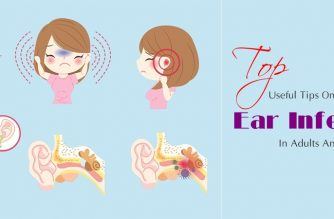Updated: 12/13/2019
Table of contents
Sometimes, there are diseases that come and go in your body, but you don't even realize it. Ear infections are some of those. They often occur in children and disappear on their own. Although they are not common in adults, it can be more severe when they appear. An ear infection can bring about aggravating consequences if it is not carefully handled. You should know that prevention costs less than a cure. Therefore, today, we at Effective Remedies will provide you with effective methods on how to prevent ear diseases in children and babies.
- Top 18 useful ways to remove clogged ears
- Top 13 time-tested remedies for swimmer’s ear
- Top 22 Home Remedies For Ear Infections In Adults. (This article was medically reviewed/fact checked by Nichole Dandrea-Russert, MS, RDN.)
Top 6 Useful Tips On How To Prevent Ear Infections In Adults And Babies
I. What Are Ear Infections and What Cause Them?
To fully understand ear infections, let's first clarify what an infection is. It is an invasion of harmful organisms such as bacteria, fungi, parasites, arthropods, or viruses into your body. Their rapid growth and release of toxins causes sickness.
Ear infections, also known as otitis, have three main types: infections of the outer ear, middle ear, and inner ear.
Outer Ear Infections
When an infection happens on the outer ear or ear canal, it's called by many names: otitis externa, external otitis, or swimmer's ear[1]. The ear canal is warm and dark, which is ideal for germs to develop. An article in ScienceDirect showed that, in a year, 1 – 3% of people are affected by swimmer's ear. Of those people, 5% of the cases are chronic (lasting more than three months) and 95% are acute (lasting less than six weeks)[2]. The cause of acute otitis externa is usually a bacterial infection due to ear exposure to a dense congregation of pathogens that damage ear skin. Chronic otitis externa is often caused by chronic skin diseases, allergies, other pathogens such as fungi, or autoimmune disorders.
EffectiveRemedies Partner Solutions

Ask a Doctor Online and Get Answers in Minutes, Anytime!
Have medical questions? Keep asking questions to a Verified Expert until you get the answer you need.
Middle Ear Infections
The middle ear is the part that lies behind the eardrum and in front of the oval window of the inner ear. Middle ear infections, otitis media, happens when the Eustachian tube doesn't work properly. This is most often precipitated by an upper respiratory tract infection (URTI), streptococcal pharyngitis (strep throat), or allergies[3]. Due to the dysfunction of the Eustachian tube, the gas volume is locked in the middle ear, and the nearby tissues absorb part of it, which results in negative pressure in the middle ear. The negative middle-ear pressure may build up until the nearby fluid from the tissue is pulled into the middle ear's space. This process is a so-called middle-ear effusion. A middle ear effusion is not always an infection but simply “fluid in the middle ear.”
Inner Ear Infections
The inflammation of the inner ear is called otitis interna, and two types are labyrinthitis or vestibular neuritis. This inflammatory otitis is rare in comparison to the other types of otitis. The most common cause is a viral or bacterial infection of one of the two vestibular nerves. Other possible causes are autoimmune complications, vascular ischemia, micro-trauma, or rupture of endolymph[4].
II. Why Should You Prevent Ear Infections?
Pain and discomfort are definitely present when you have ear inflammation; and the pain is going to be more severe if you have both ears involved. In some cases, the infection can distort your hearing or cause complete hearing loss[5]. It's going to be tough if you suddenly have to live without an important sense of your body.
You will be very like to have fevers and miss the days of work or school. If you are lucky, the symptoms may disappear by themselves or else, they are going to agonizingly persist for a long time. Plus, once ear infections occur, they are more likely to recur. The bills for going to the doctors, medicines, and treatments will unquestionably surge. You may have to lose extra time to do physical therapy and exercises or undergo surgery. Last but not least, your ear may look deformed if you have multiple cases of chronic otitis externa.
III. Risk Factors Of Ear Infections
- Age: Children between the age of 6 months to 2 years are more likely to have ear infections due to having short and narrow Eustachian tubes and less developed immune systems.
- Seasonal change: People who have seasonal allergies or who live in a humid climate are more susceptible to inflammation of the ear.
- Submergence in contaminated water such a stagnant bath water or lakes.
- Putting foreign objects into the ear: cotton swabs, finger or earphones that break the barrier of the skin.
- Allowing non-sterile water to remain in the ear canal after a shower
- Changes in altitude
- Chronic skin conditions such as eczema or psoriasis
- Weakened immune systems
- Air pollution
IV. Symptoms Of Ear Infections
- Pain following a few days of a flu or cold: According to a survey done in Japan, “about 30% of all cases had common colds prior to [an outer ear infection], the rate being highest among children below 10 years”[7].
- Earache: Sudden pain or continuous pain in the ear
- A feeling like the ear is full inside
- Nausea
- Sudden deafness
- Fluids come out of the ear
- High fever
- Swelling or itching of the ear
- Vertigo (dizziness, loss of balance)
V. How To Prevent Ear Infections
1. Strengthen The Immune System
When you have a weakened immune system, you are vulnerable to all kinds of diseases. You can protect yourself from pathogenic factors by choosing a healthy lifestyle. Follow these strategies to boost your immune system:
- Incorporate more fruits and vegetables into your diet
- Exercise 3-7 days a week
- Get enough sleep[8].
- Try to lower stress and how you mentally respond to stressors[9].
- Lower your alcohol intake
- Get up to date on vaccines
2. Stop Smoking
In the journal of Nicotine and Tobacco Research, research shows active smoking likely has a direct link to an increased chance of hearing loss[10]. The data also imply the number of cigarettes smoked is associated with the degree of hearing impairment[11]. After smoking cessation, the increased risk of hearing loss is absent. Passive smoking can also contribute to hearing loss, especially in children[12].
3. Breastfeeding
For babies, breast milk provides the most ideal nutrients to improve their immune system and contains antibodies that protect from viruses and bacteria. Infants who are breastfed for six months or longer are less likely to have ear infections during this time[13].
4. Minimize Contact To Germs
Germs are the main reason you get infections and your hands are the main medium that spreads the germs. Wash your hands with hand sanitizer regularly, so that you don't accidentally spread it to other areas on your body or onto somebody else. This can also prevent common cold and illness.
Avoid touching your nose, eyes, and ears, particularly when you are sick. Because the nose, eyes, and ears are all interconnected, when something is wrong with one part, the other parts are going to be affected.
Avoid ingesting non-sterile water or swimming in dirty water including after a rain. Many studies have shown that rainwater may have microbial pathogens or chemicals that could make you sick if ingested as well[14]. When rainwater hits the ground and splashes onto you, it carries germs from the ground with.
Avoid standing in extremely crowded places.
Avoid putting objects into your ear canal. You don't need to use cotton swabs because your ear has a self-cleaning and self-drying mechanism. If you must use earphones or headphones, make sure to clean them frequently.
5. Use Drops
Use manufactured ear drops that contain dilute acetic acid or Burow's solution. You can also make your own drops by diluting vinegar with water in 3 to 1 proportion. Vinegar is proved to be able to effectively inactivate viruses and bacteria and is a known prevention for otitis externa[15]. It is effective to prevent external ear infections when used after swimming[16]
6. Use Battery-Powered Ear Dryer
Warm and moist areas are the best environment for bacteria to grow. A battery-powered ear dryer can help safely and effectively dry the ear canal so that bacteria cannot grow uncontrollably. It comes with reusable earpieces that you can clean and reuse. This way, it minimizes the introduction of germs into the ear and injuries to ear skin. Battery-powered ear dryer is a must-have item for people who play water-related sports and is easy to purchase.
VI. What To Do If You Have Ear Infections
- The first thing you should do when you notice ear infection symptoms is to visit a doctor to get the appropriate treatments.
- You could apply a warm cloth or a warm compress on your ear to relieve pain.
Ear infections are not something to be taken lightly. They may lead to serious health problems that are painful and costly to cure. Therefore, you shouldn't wait for it to happen and then try to cure it. Keep in mind the prevention methods we provided above and tell your friends about it. If you have any questions or opinions about this article, feel free to share it in the comment box below. We are always eager to hear your thoughts.
All content provided are for informational & educational purposes. We recommend you consult a healthcare professional to determine which method is appropriate for you.








